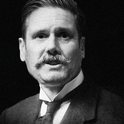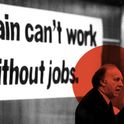My annual 24-hour visit to the Labour party conference did not go according to plan, but it could have been a lot worse. Buoyed by the news that the Daily Telegraph had named me 89th most influential person on the British left (Yes! Bizarrely ahead of real lefties like John Pilger and even the head of the Fabian Society), I jumped on a train to Bournemouth on Monday afternoon. I was looking forward to speaking at an IPPR fringe event on multiculturalism at 7pm, going to the Guardian/Observer party at 9pm, hanging around enjoying the political chit-chat, sticking my nose in at a fringe event or two on Tuesday morning, listening to Gordon Brown's first speech as leader on Tuesday afternoon and then getting a train back to London. But even before I got off the train I discovered that part of my plan had unravelled—Gordon had already delivered his speech. Tony Blair always spoke on Tuesday; why did nobody tell me Gordon was switching to Monday?
When I got to my bed and breakfast to drop my things and prepare my five-minute contribution to the fringe debate, things looked as if they were going to unravel rather more—I opened the envelope with my conference pass in it and discovered the picture on the pass was of my brother Daniel Goodhart, who works as a cameraman for the German TV network ZDF and who also had a conference pass (see right). Someone in the Labour press office must have picked out a picture from the D Goodhart file without noticing there were two of us. I rang Daniel straight away in case he was still in Bournemouth and could vouch for me if the wrong picture prevented me getting into the secure zone—alas he had already gone back to London. I slumped in a chair and watched the gushing coverage of the Brown speech on the BBC Six o'clock news.
Fortunately the police officer checking passes into the secure zone did not look closely at mine and waved me through. I found my way to the Tralee Hotel, which was a jungle of competing fringe events. I complained to anyone who would listen that more has become less on the fringe. There are far too many events with far too few people attending them; Labour should rationalise the system by insisting that each think tank is only allowed two events a day. But someone from the SMF explained to me that this would wipe out half the think tanks in Britain. "You don't understand, this is where we make our money," she said. The scales fell from my eyes. Every event on a dreary specialist subject in a faraway hotel attic attended by nine people is sponsored by three companies which have each put up, say, £5,000—giving a net profit for the event of £14,500. The big companies are happy to spend their money this way—it's simple, and in its way public-spirited—and the think tanks are happy to survive for another year at the cost of one over-hectic week.
The IPPR event—with the MPs David Blunkett and Parmjit Dhanda, Mori's Ben Page and me—was reasonably well attended but otherwise unmemorable. (We did have quite an interesting brief debate about the use of school buses to enforce integration in the US, and I ventured that it had been a disaster for the Democrats—to be quite honest I'm not sure if that is true, but nobody contradicted me, anybody care to now?) The rest of the evening was spent in a pleasant alcoholic haze. I remember arguing with Jon Snow's sycophantic characterisation of Gordon Brown as a giant intellect compared with the empty vessel that was Tony Blair. And cadging cigarettes off the delightful Lauren Booth, who turns out to know rather a lot about the middle east (as much as her brother-in-law?). I also remember an interesting debate with Martin O'Neill (Lord O'Neill of Clackmannan) about what equality could possibly mean in the relationship between England and Scotland.
On Tuesday I experienced (or rather re-experienced) the death of the political speech. I watched a re-run of Brown's speech from the day before. It was not really a speech at all—there was no argument, no analysis; it was a political positioning exercise for the Brown brand. Nothing wrong with that in principle, although it is a shame that a serious intellectual like Brown cannot make a serious speech. Blair's conference speeches were miles better—yes, they were often theatrical, but they did also generally have some argument within them, some attempt to persuade his own party of the rightness of some reform or other. The demise of inner-party democracy and a leader who is at peace with his party, like Brown, means that there is no reason for argument at all.
I did see the David Miliband foreign policy speech at lunchtime on Tuesday. By his rather lacklustre standards, it wasn't too bad. There was lots of meaningless rhetoric and a few statements of the obvious about how democracy cannot be built via the military, and how the motives of Britain and America are perceived negatively by young Muslims around the world. The Guardian described this as a brilliant and daring break with Blair's foreign policy. But come on David, it must be possible to combine pressing the right soundbite buttons with a bit more intellectual ambition.
Our man in Bournemouth
September 26, 2007












